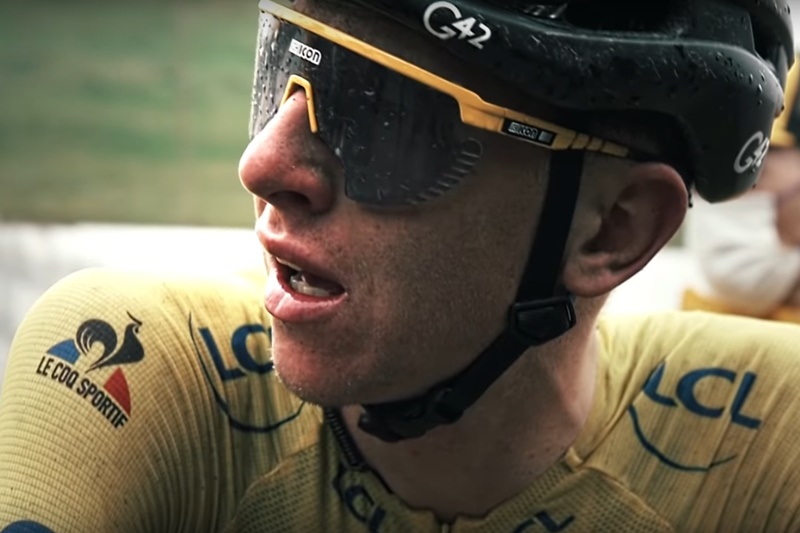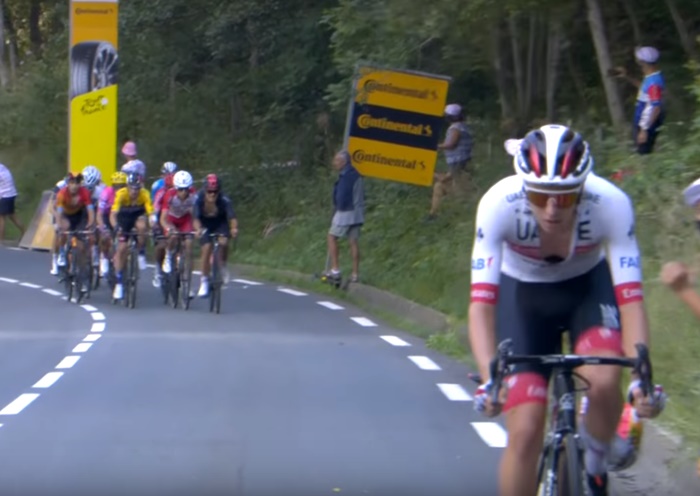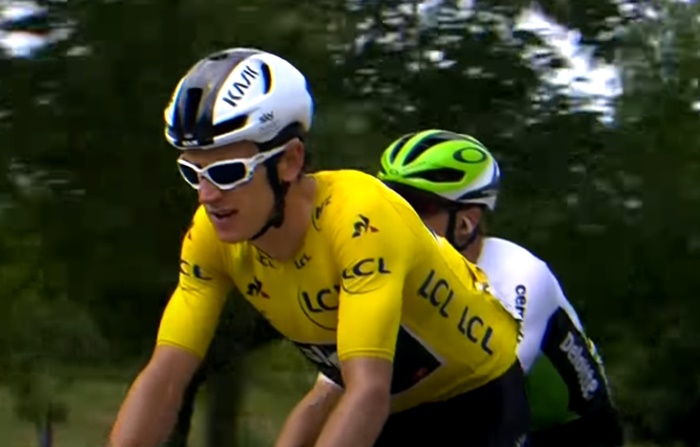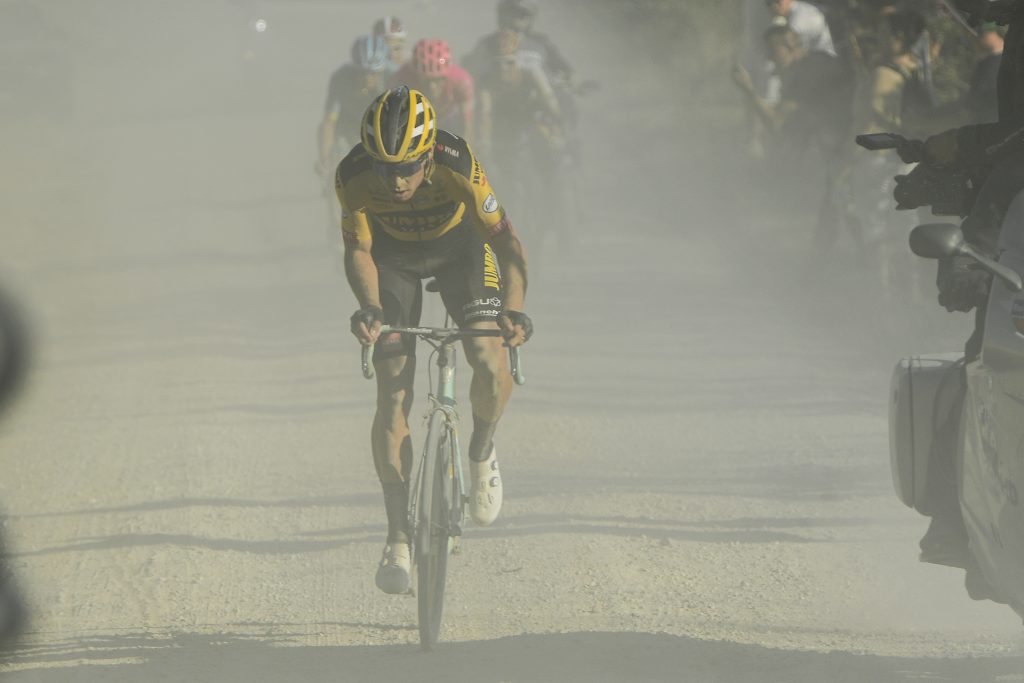
There’s plenty of scope for slip-ups and misfortune over the course of a three-week bike race. All the same, it’s hard to see the 2022 Tour de France as anything other than Tadej Pogacar v Primoz Roglic v Covid-19.
- Preview
- Week 1 recap
- Week 2 recap
The favourite
Tadej Pogacar’s 2020 Tour de France win was a bit of a funny one. Lockdowns and postponement to September meant that the contenders didn’t prepare as they normally would. His 2021 victory was therefore arguably more meaningful and he’s since established himself as a reliable winner of big one-day races as well.

While he’s a strong time-trialist and just about the best climber around, Pogacar’s greatest attribute appears to be an ability to shrug off the effects of all the preceding stages in a race and zip about as if he considers a pack of Haribo and three cans of Relentless to be a balanced meal.
So far this year the Slovenian’s entered three week-long stage races and won all of them. However, one man he hasn’t come up against in these races is his countryman.
The second-favourite
If you were to take the Tour de France out of things – which I’ll concede is a pretty big and misleading extraction – Primoz Roglic actually has a more impressive record than Pogacar. This is of course in large part because he’s nine years older, but that shouldn’t mask the fact that he has won three Vuelta a Espanas (that should probably be Vueltas a Espana) and has been reliably hoovering up week-long stages for years. He is not to be taken lightly.

Roglic also benefits from having use of a better team. Jonas Vingegaard was second to Pogacar last year after Roglic crashed out. Sepp Kuss saves his efforts for the mountains, where freshness allows him to out-climb pretty much anyone. Steven Kruijswijk was third in the 2019 Tour. And then there’s Wout van Aert, a three-time cyclo-cross world champion who can win time trials, cobbled stages, flat sprints and even in the mountains – a handy man to have around in other words.
Covid-19
That over-familiar bloody illness isn’t in quite the same earth-shattering form as in 2020 and 2021, but it still retains the capacity to really knacker up a bike race.
A couple of weeks ago, the Tour de Suisse lost 29 riders in one day. If Covid gets a toe-hold at the Tour de France, these race predictions could quite quickly become irrelevant.
The others
It feels like there’s probably a bit of a step-down from Slovenia to the rest of the world, but there are of course plenty of other riders who won’t see things that way.
Chief among them is 2018 Tour winner, Geraint Thomas. In the absence of Egan Bernal, who broke plenty of bones after riding into a bus over the winter, he is Team Ineos’s main man.

Victory at the Tour de Suisse shows Thomas has decent form and that 2018 win shows he at least has the capacity to be up there with the very best climbers. Whether he can reach quite that level again is another matter. He’s 36 now and hasn’t done anything at a Grand Tour since finishing second when defending his title in 2019. Adam Yates and Dani Martinez are Ineos’s other options.
Ben O’Connor was fourth last year and is young enough that he may well have improved; Nairo Quintana is always worth a mention, albeit he hasn’t delivered a Grand Tour top 10 finish since 2019; and Romain Bardet was looking resurgent at the Giro d’Italia until he vomited his way out of the race.
Aleksandr Vlasov is the dark horse pick in his Tour debut. The Russian’s little-known in the English-speaking world having never really been a big one for interviews, but he won the Tour of Romandie and was leading the Tour de Suisse before contracting Covid.
The presence of Russians in sports events feels super weird at the minute. For what it’s worth, Vlasov doesn’t seem mad-keen on the war in Ukraine.
“I, like a lot of Russians, just want peace,” he wrote on Instagram earlier this year. “I’m not a political person, and normal people like me weren’t asked if we want a war. It has been a shock for everyone and I hope that it will stop as soon as possible.
“It’s a difficult situation for everybody. I feel sorry for all the people who are suffering, and I hope that there will soon be peace. I am an athlete and my goal should be to unite people across political borders, rather than divide them. I think that should be the role of sports.”
Finally, Chris Froome is riding. Don’t expect to see him sailing away from everyone on mountain stages though. Froome’s a stubborn man, but I think even he’d acknowledge that his long, slow recovery from breaking a million bones after getting blown sideways into a brick wall has at this point begun intersecting with age-related decline.
The points competition
Last year’s green jersey winner Mark Cavendish hasn’t been picked. His team has instead gone for Fabio Jakobsen, the Dutch rider who underwent countless surgical procedures to repair his face and body after being pushed into the barriers at the 2020 Tour of Poland. Pretty much everyone in cycling is keen for him to do well, including Cav, who will nevertheless have his bags packed in anticipation of last minute Covid.

2020’s green jersey winner Sam Bennett hasn’t been picked either. That means Wout van Aert is probably the favourite for this competition. Other challengers include two Australians, Caleb Ewan and Michael Matthews, and Dylan Groenewegen, the man who infamously caused Jakobsen’s horror crash. Oh and Peter Sagan, who’s probably not the force he was, but has won the green jersey seven times.
Mathieu van der Poel may or may not have a dart at it too. It would be good if he did as he showed last year that he is now officially the Tour de France rider most likely to make you say ‘bloody hell!’
The mountains competition
Otherwise known as the King of the Headcases competition, the polka dot jersey is not about mountains exactly. It’s more to recognise the rider who’s been most keen to get into the break – albeit with an emphasis on big mountain stages.
Tadej Pogacar pretty much won it by accident last year because the race awarded double points for summit finishes and he took those stages. This year they’ve correctly abandoned that which should shift the balance towards mid-stage climbs and therefore back towards the breakaway riders.
There is no saying exactly who these riders will prove to be, but it does at least promise to be a more interesting fight than last time around.
What’s next?
The Tour starts on Friday in a little-known part of France known as “Denmark”. After a short time trial and two sprint stages there’s then an early rest day before the race recommences on actual French soil.
I usually do recaps on each of the rest days, but I’m not sure about this first one. It might end up being bundled in with the recap of the following week.
Either way, you can sign up to get the articles from this site by email here. You have two options. You can choose to get every article, or articles about the Tour only.
Leave a Reply